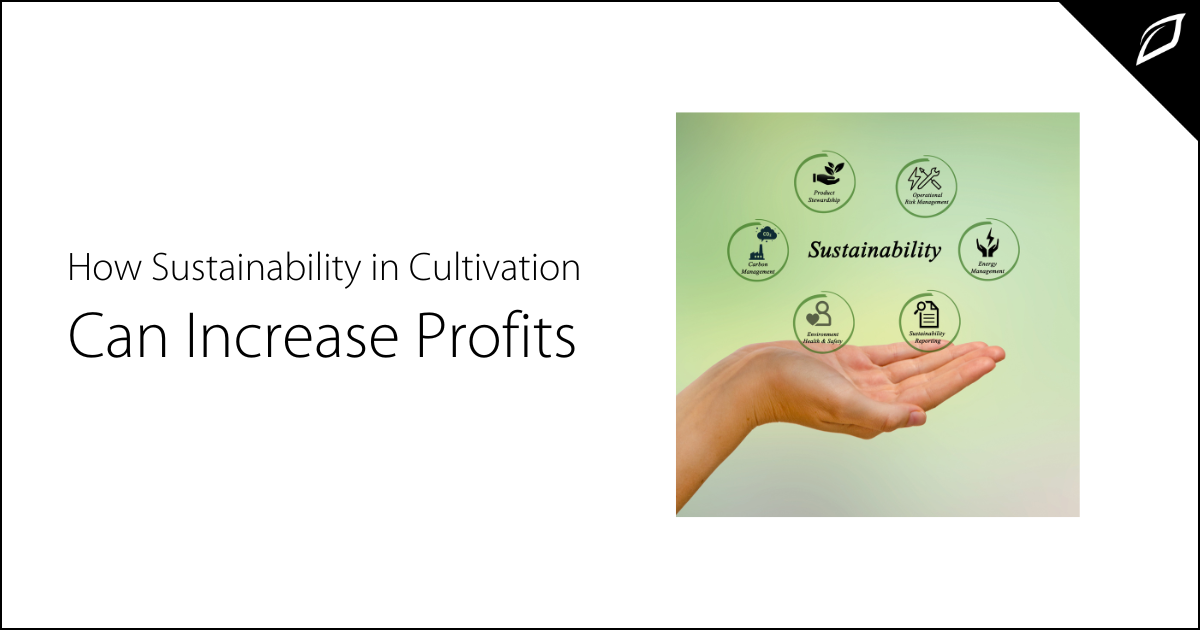3 min read
Sustainability In Cannabis Cultivation Increases Profits
Joy King : Updated on March 24, 2023

Sustainability in cannabis is a great sound bite in media, blogs, and marketing materials, but business owners need to make a profit and thrive. Can you be sustainable and profitable? Let us look at ways to improve profitability through sustainable business practices.
What is sustainability in cannabis cultivation?
The official Wikipedia definition of sustainability is that it "meets the needs of the present without compromising the ability of future generations to meet their own needs." As it pertains to cannabis, it means everything from recycling programs, saving resources, using sustainable packaging, reducing harmful chemical usage, etc.
We will examine sustainability in the cultivation. How and why we grow the way we do impacts our profitability and how sustainable our business practices are. Let's examine ways your business can increase sustainability while increasing profits at the same time.
Planning
The best way to embrace sustainability in your cultivation facility is to hire an expert architect who can build sustainability methods into the building design. Whether that's a greenhouse/indoor grow hybrid that offers the ability to harness the power of the sun or a Rockwool recycling program, understanding your options is key.
We asked Sam Andras, the EVP of Professional Services from Urban-Gro, to give us insight into how planning ahead can increase profits while reducing a company's carbon footprint. "Sustainability in controlled environmental agriculture comes in a wide variety of options. An experienced architect and design team can provide detailed information such as equipment and installation costs, operational savings, maintenance costs, and availability to assist owners in making informed decisions. Many sustainable solutions will lower a company's OpEx and thereby become a part of the evaluation criteria." Sam has worked in the industry for decades and brings real world experience and business acumen to the company. Urban-gro guides your team through a highly coordinated, efficient process of facility design, engineering, start-up, and managed services.
Waste
Waste is any substance discarded after primary use and potentially one the largest single area for sustainability improvement. Everything your cultivation facility throws away as trash is waste, but does it have to be? Can you recycle some of the waste? Can you buy reusable foot covers? Can you reuse plastic pots? You may find ways to adjust your buying habits by looking at your waste. Examine ways your waste can evolve into becoming a cost-free resource.
Resources
Resources are essential elements of a business. Resources are distinguished as renewable or nonrenewable. Nonrenewable resources have a limited supply. Maximizing your efficient use of both renewable and nonrenewable resources is paramount to increasing sustainability. Let's break down the resources you may be able to adjust to make your cultivation facility sustainable while saving money.
- Water: Precision indoor irrigation practices are a practical way to be sustainably minded and can reduce the amount of water you use. It eliminates the possibility of human error and reduces the amount of labor spent on watering and fertilizer. Nutrient delivery or dosing systems allow you to choose how you feed. Whether filling multiple batch tanks or feeding directly to your plants' irrigation zones, fertigation systems can accurately and precisely dose limitless recipes allowing you to automate your entire irrigation strategy from seedling to harvest. Stop sending precious water resources down the drain. Sophisticated automated nutrient dosing systems can save labor costs while saving you money on your water bill by only feeding plants what they need when they need it, especially when you're crop steering. New to cannabis crop steering? Download the free e-book here.
- Electrical: With electrical bills being one of the highest expenses of your grow room, you'll want to find ways to mitigate the costs while finding sustainable ways to grow. Energy is one of the primary cost drivers, and lighting and HVAC are the largest power consumers in your business. Let's examine them more closely.
- HVAC: Consider more than the price and the size of your HVAC equipment. Consider the operational efficiency. Canadditional venting during cool periods assist? Can supplemental fans play a role in keeping temperatures down during hot spells?
- Lighting: Choosing energy-efficient LED lighting over high-intensity discharge (HID) bulbs can reduce energy consumption by more than a third. Or better yet, build an indoor cultivation facility with greenhouse-like roofs that allow sunlight to be your primary light source. Use supplemental lighting during cloudy days or evenings.
- Substrate: Changing from hydroponics to organic or living soil is another way cultivators can make their operations more sustainable. But soil-based substrates, while teeming with microorganisms that organically break down matter and gradually release nutrients to plants, can introduce new concerns like soil-borne pests and challenges in sourcing raw materials. If living soildoesn't save enough in purchasing nutrients to justify a significant shift in how you grow, consider creating a recycling program to deal with Rockwool or coconut coir waste.
- Nutrients: Researchers at the University of Oxford published a study on sustainability. One of the most comprehensive analyses to date of the destruction our current farming practices are doing to the planet. They advocate avoiding animal products entirely to lessen greenhouse gases and end factory farming of animals. They also recommend vegan or vegetarian diets for humans to save the planet and reduce our environmental impact. That seems unlikely today, but using plant-based nutrients can help you do your part. And still enjoy healthy plants and large yields.
Sustainable operations rely less on global supply chains, making sourcing more efficient.The lasting savings of energy-efficient cultivation systems pay for themselves eventually. Consumers support businesses through their buying power. If sustainability is a core value, tied to your brand, allow sustainability to bring consumers to you and your products. To get a deep dive into cannabis sustainability, check out this e-book from our friends at MJBizCon!
